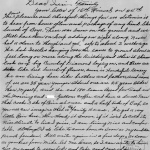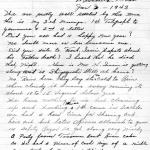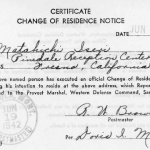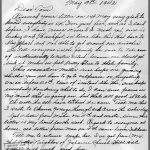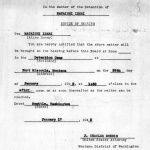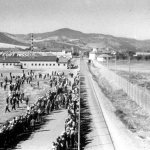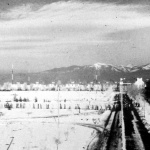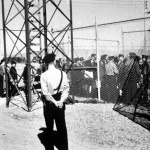Fort Stanton (detention facility)
| US Gov Name | Fort Stanton Internment Camp |
|---|---|
| Facility Type | Department of Justice Internment Camp |
| Administrative Agency | U.S. Department of Justice |
| Location | Fort Stanton, New Mexico (33.4833 lat, -105.5167 lng) |
| Date Opened | |
| Date Closed | |
| Population Description | Mostly held German nationals and German seamen from the luxury liner Columbus captured in U.S. waters in 1939. Also held those considered by the Department of Justice to be the most "troublesome" Japanese internees: ten Nisei and Kibei "renunciants" and seven Issei transferred from the Santa Fe internment camp. |
| General Description | Located in isolated southern New Mexico in Lincoln County, 35 miles north of Ruidoso. Fort Stanton was originally established in 1855 and was used in 1899 as a tuberculosis sanatorium. |
| Peak Population | |
| National Park Service Info | |
The Fort Stanton Internment Camp in central New Mexico was the first detention facility opened by the Immigration and Naturalization Service and mostly held German seamen and German enemy aliens. In 1945, it became a secret detention camp where seventeen Nikkei inmates removed from the Santa Fe camp for disciplinary reasons were held for around six months.
Fort Stanton was located in Lincoln County about 35 miles north of Ruidoso and 175 miles south of Santa Fe. Built by the army in 1855, it played roles in the Civil War and the Lincoln County War. By 1899, it had become a tuberculosis sanitarium and remained one for the next few decades. In the 1930s, the CCC improved the site and added additional buildings including living quarters for around 200. [1]
In 1941, Fort Stanton became the first dedicated INS detention facility when the agency needed a place to keep seamen captured from a German ship, the SS Columbus . When the INS took control of the Fort Stanton site, it raised the residential capacity to 450 and moved 411 of the seamen there in March 1941. Over the next two years, additional German seamen and some POWs were moved to Fort Stanton, the population reaching 652 by August 1943. Also in 1943, the INS established a separate high security compound where German internees deemed extremist could be segregated. The INS also moved eighty-three pro-Nazi seamen to Fort Stanton from Fort Lincoln , with Fort Lincoln chronicler John Christgau dubbing Fort Stanton "a segregation camp for the most rabid Nazis." [2]
In the early months of 1945, a group of suspected Japanese American dissidents at Tule Lake were transferred to the Santa Fe Internment Camp. Subsequent unrest at Santa Fe in March 1945 led authorities to remove seventeen men from Santa Fe and to incarcerate them at Fort Stanton, in a separate high security compound. The group included seven Issei and ten Nisei/Kibei, all but one of whom were thought to be Japanese nationalist leaders behind the unrest. The seventeenth man was an Issei whom the administration wanted out of Santa Fe for other reasons. The existence and location of this camp was kept a secret from Japanese Americans held at other INS camps or at War Relocation Authority camps and was referred to as "Japanese Segregation Camp No. 1"; mail to the camp was routed through the Santa Fe camp. The Japanese American complex included ten 16' x 16' "Victory Huts" that slept two men and a latrine and was surrounded by a ten to twelve foot high barbed wire fence. They shared other facilities—laundry, recreation room, kitchen, showers—with the German internees and played cards and chess with them. After around six months, the Nikkei group was transferred to a detention facility on Terminal Island on September 20, from where they were removed to Japan. [3]
As the Nikkei group were departing, around sixty-five Nikkei "volunteers" arrived from Santa Fe to dismantle the camp. Issei journalist and internee Yasutaro Soga wrote in his memoir that most of this group consisted of men who had come to Santa Fe from the Kooskia , Idaho, work camp and that they were paid for their labors. "It should be noted that they were forced to move," he pointedly added. Fort Stanton closed in October, and Soga notes the return of the men from Fort Stanton back to Santa Fe on October 20. [4]
Fort Stanton was listed in the National Register of Historic Places in 1973, as was the Fort Stanton Historic District with increased boundaries in 2000. However, neither listing includes the site of the Nikkei compound. There are remains of the internment camp at the site today including two standing buildings and parts of others. Archeological remains of the Nikkei compound have also been found. [5]
For More Information
Akashi, Motomu. Betrayed Trust: The Story of a Deported Issei and His American-Born Family During World War II . Bloomington, Indiana: AuthorHouse, 2004.
Tom Akashi interview by Tom Ikeda (primary) and Chizu Omori (secondary) . Klamath Falls, Oregon, July 3, 2004. Densho Visual History Collection. Densho Digital Archive.
Cencula, Tessa Moening. "Fort Stanton and the Japanese Segregation Camp No. 1." In Confinement in the Land of Enchantment , ed. Sarah R. Payne. Fort Collins, Colo.: Colorado State University, Public Lands History Center, [2017]. 76–85.
Kashima, Tetsuden. Judgment Without Trial: Japanese American Imprisonment during World War II . Seattle: University of Washington Press, 2002.
Footnotes
- ↑ Kara Carroll and Andrew B. Russell, "The Santa Fe Detention and Internment Camp," edited by Gail Okawa, in Confinement in the Land of Enchantment, ed. Sarah R. Payne. Fort Collins, Colo.: Colorado State University, Public Lands History Center, [2017], 53; Tessa Moening Cencula, "Fort Stanton and the Japanese Segregation Camp No. 1," in Confinement in the Land of Enchantment, ed. Sarah R. Payne. Fort Collins, Colo.: Colorado State University, Public Lands History Center, [2017], 78.
- ↑ Tetsuden Kashima, Judgment Without Trial: Japanese American Imprisonment during World War II (Seattle: University of Washington Press, 2002), 17, 121; Cencula, "Fort Stanton and the Japanese Segregation Camp No. 1," 78–79; John Christgau, "Enemies": World War II Alien Internment (Ames: Iowa State University Press, 1985; Lincoln, Nebraska: Authors Choice Press, 2001), 39.
- ↑ Kashima, Judgment Without Trial , 121–22; Cencula, "Fort Stanton and the Japanese Segregation Camp No. 1," 81–85.
- ↑ Cencula, "Fort Stanton and the Japanese Segregation Camp No. 1," 85; Yasutaro [Keiho] Soga, Life behind Barbed Wire: The World War II Internment Memoirs of a Hawai'i Issei , translated by Kihei Hirai (Honolulu: University of Hawai'i Press, 2008), 200, 209.
- ↑ Barbara Wyatt, ed., Japanese Americans in World War II: National Historic Landmarks Theme Study (Washington, D.C.: National Historic Landmarks Program, National Park Service, U.S. Department of the Interior, 2012), 166.
Last updated July 6, 2021, 9:30 p.m..

